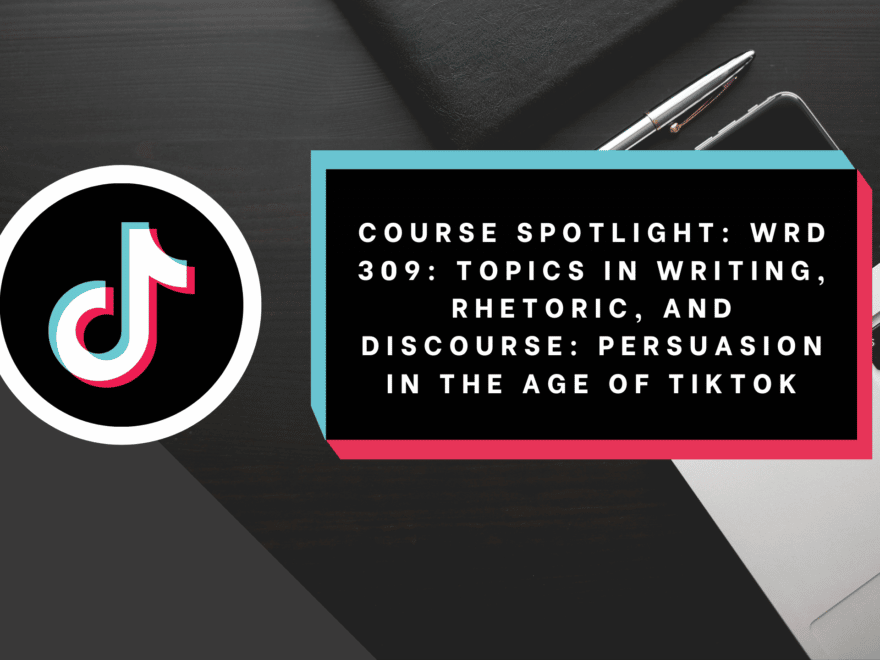One of the incredible things about studying rhetoric and discourse is how our modes of communication are always evolving. That means that even social media is part of our social discursive lives. What better way to explore how these incorporations impact our cultural rhetoric? Professor Margaret Poncin Reeves is teaching an upcoming class all about the topic with a special focus on TikTok.
Read on to see what the course has in store for Winter Quarter / WQ23!
What inspired you to teach WRD 309?
Two things: The first is the topic of the cross-listed course, which is LSP 275: Lived Civics, the Social Contract, and Public Life. This is an interdisciplinary course designed to encourage students to draw on their lived civic experiences—from voting to activism to navigating the immigration system. I’ve found that DePaul students care deeply about civic issues. But their lived experiences with systemic racism, political polarization, and the pandemic sometimes leave them feeling hopeless about their ability to enact change. Exploring the social contract—a key framework for LSP 275—can help us move beyond political antagonism to promote progress on these issues that have had so much impact on our lives.
The second motivation, which inspires the WRD 309 title “Persuasion in the Age of TikTok,” has been my own experiences with social media. I can see the ways I’m being drawn into an ideological silo while simultaneously becoming addicted to the little rush of dopamine that occurs with each refresh of my feed. We’ve all seen people who seem to be sucked into their devices, only half aware of the world around them. At the same time, this digital space isn’t separate from the real world; it is the real world. And so as students of rhetoric and writing, we need to know how these mediums shape our political conversations and—as a result—our political systems.
Do you have a specific TikTok moment/post in mind that would inspire dialogue?
I don’t have a specific moment in mind. One of the interesting things about TikTok is that we’re not sharing these moments anymore because the algorithm is personalized to our interests. And this is impacting our civic experiences as well—we have radically different outlooks depending on the content we’re consuming.
What should students expect to walk away with from this class?
It turns out that classical models of persuasion…don’t really work. And that has become particularly visible in online spaces. So we’ll be looking at what does change people’s minds.
At the same time, students will gain an understanding of social contract theory and how it can be used to understand our democratic system. The result, I hope, is that students will be better prepared to engage with others on some of the most pressing issues of our time.
Is TikTok good or bad for our social selves?
In our personal lives, I certainly think that we can build online communities and even close friendships in digital spaces, which is healthy for our social selves. We’ve also seen huge societal shifts around social justice issues in the past 15 years, driven in no small part by social media. For groups who have traditionally been ignored or maligned in older, more centrally controlled forms of media, the representation and community can be (very literally) lifesaving.
However, in the past few years (in the “Age of TikTok” in other words), I’ve become rather pessimistic about the impact of social media because of the way the algorithms reward outrage and extremism—and the way that many politicians (both left and right) have very successfully harnessed this negativity. Additionally, while the science on this is far from settled, there has been a lot of persuasive research warning about the negative impact on folks’ mental health and ability to focus.
Should our rhetoric and discourse field be doing more work around social media? Why or why not?
There’s a lot of excellent work happening around social media, including in our own department. For example, Tony Ceraso and Lisa Dush both center much of their scholarship around digital writing and rhetoric, and Jason Kalin has done work on mobile technologies. There are also lots of folks who have produced work on social media as a pedagogical tool—Amanda Gaddam, Tricia Hermes and Amy Hornat-Kaval come to mind.
These platforms are so central to how we communicate these days; WRD is most certainly paying attention!
